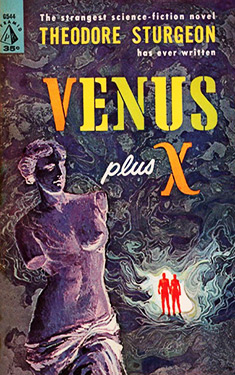Theodore Sturgeon
Completed 12/15/2015, Reviewed 1/4/2015
4 stars
I really love Theodore Sturgeon. He writes terrific prose and usually finds a
way to shock me. This book is no
different. Charlie Johns is a kind of
everyman who is plucked out of everyday life and dropped in the middle of Ledom
(backwards for Model), a society that feels it is on its way to being a
utopia. Here everyone is
single-gendered, removing all the evils of the patriarchal world. But can Charlie cope?
 “Venus Plus X” was very much ahead of its time. It was published in 1960, just ahead of the
modern feminist movement. While there
were other books about female utopian societies, as far as I know, there wasn’t
anything single-gendered or androgynous.
Particularly, not during the pulp SF days. It would be more than ten years before LeGuin
would write “Left Hand of Darkness”.
“Venus Plus X” was very much ahead of its time. It was published in 1960, just ahead of the
modern feminist movement. While there
were other books about female utopian societies, as far as I know, there wasn’t
anything single-gendered or androgynous.
Particularly, not during the pulp SF days. It would be more than ten years before LeGuin
would write “Left Hand of Darkness”.
Sturgeon does it so well mostly because of his prose. He writes really well, even when most of the
book is simply the people of Ledom explaining their lives and world to
Charlie. One would think this would get
boring, but it doesn’t. Then to
contrast, interspersed through the text, Sturgeon also follows two families in
the present day (1960) where the sexual revolution seems to be beginning. The wives go out bowling talking about work
while the husbands stay home and take care of the kids. We are made painfully aware that it is just
the beginning when the father kisses his daughter goodnight, but shakes his son’s
hand.
I think it’s significant that Sturgeon emphasizes the point
that Ledom is not a utopia. It is a
transition to becoming a utopia. By
removing the sexual differences, all the other differences begin to fall to the
wayside. It is not perfect, as we see in
the end, but it is better than what we have now. This is an important book because it calls us
to keep on looking at ourselves, at how far we’ve come, and how far we still
have to go to achieve equality. Is it by
becoming more gender-neutral? Maybe,
maybe not, but certainly things seem to be better as we focus less on the
differences between each other and more on what makes us the same. I give this book four out of five stars.
No comments:
Post a Comment